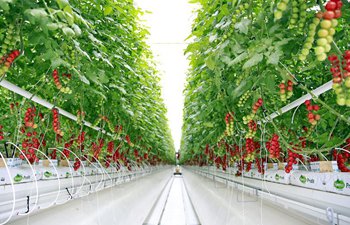NAIROBI, Nov. 10 (Xinhua) -- A scientist on Friday urged African governments to enact timeline for ending landfills to help reduce methane in the atmosphere.
Professor Lene Lange from the Center for Bioprocess Engineering, Technical University of Denmark attributed climate change to the increasing greenhouse gas (GHGs) emissions that emanate from the landfills that are common sites within African cities.
"Use methane from the landfills in producing green energy through biogas as a way of mitigating climate change impacts," Lange made the call during a symposium on bio-economy in Nairobi.
According to her, food and wastes that are dumped at the landfills also produces smoke that causes respiratory ailments to the communities living around the sites.
Landfills are the largest anthropogenic emitters of the GHG methane (CH4), hence a threat to human and mitigation of climate change.
Methane has a much shorter life in the atmosphere than CO2 (12 years compared with 100 to 300 years for carbon dioxide, reducing methane release from landfills can help rapidly reduce climate change risk.
Because methane is the main component of natural gas, it can be captured and burned for energy with a much lower climate impact than letting it seep out.
Solid waste landfills are the single largest man-made source of methane gas in most African cities.
"The transformation of the landfills to serious economic ventures has the potential of creating additional jobs for populations in the continent," Lange said.
She called for the development of the East African Bio-economy by upgrading agro-industrial in making protein animal feeds, bio-fertilizer, biofuel and ethanol and energy from cassava peels, cassava pulp, pulp from oil seed and fruit, cashew shell and coco-pod husk.
Bio-economy is capable of feeding the world by getting more resources out of land and mitigating climate change through the development of renewable fuels.
"The current scare caused by climate change that is blamed for looming extinction of crops calls for the adoption of insects as alternative sources of food for human consumption and feed for livestock," said Sunday Ekesi, Director of Research and Programs at the International Insect Physiology and Ecology (ICIPE).
He observed that knowledge-based approach on harnessing biological resources results in business partnerships between scientists, inventors, small and medium-sized enterprises, farmers, and eco and social entrepreneurs, which are more efficient and less damaging to the environment.
"Forge a bond between the academia, science institutions and industry to make agriculture competitive and biologically relevant for farmers," he told governments.
He said that by embracing bio-economy African nations are capable of commercializing the use of renewable biological resources such as crops, forests, animals and micro-organisms in solving challenges related to food, health, environmental protection, energy and industrial processes.
ICIPE is leading a program that is set to embrace bio-economy through innovative private sector to creating new economic entrepreneurship in the Eastern Africa region.
Like many parts of the continent, eastern Africa possesses large quantities of renewable biological resources and it is expected that bio-economy would be highly impactful in the transformation of the agricultural sector, which is the backbone of most economies in the region.
Women and the youth are expected to be the biggest beneficiaries once the regional countries adopts bio-economy model that is expected to create opportunities.

















